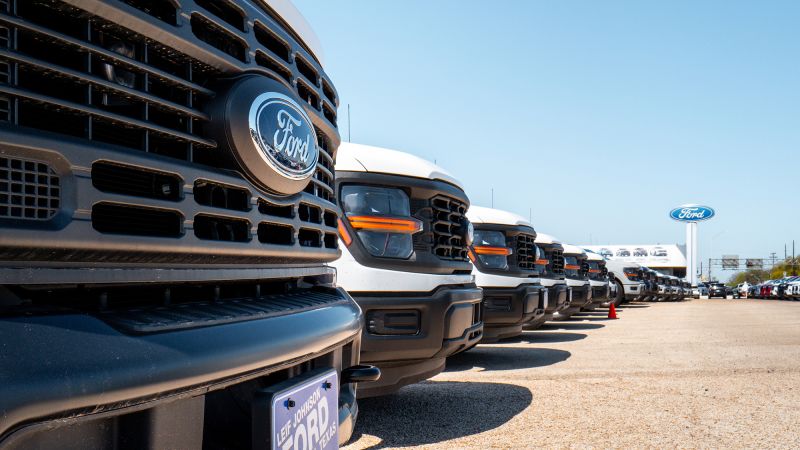CNN
—
Buyers flooded dealerships in March to snap up cars ahead of the threat of higher prices due to tariffs.
Strong March sales made up for a weaker start to the year. Ford reported Tuesday that sales in March rose 10%, a bounce from the 1.3% decline in the first quarter overall. The biggest jump was in retail sales, or sales directly to consumers, which surged 19% in March.
This sales jump comes as the Trump administration plans to impose a 25% tariff Thursday on all cars imported from foreign countries, including Canada and Mexico, and is looking to slap tariffs on auto parts later this year. Both actions could raise costs for automakers. Roughly half the cars sold in the US market are imports, and cars assembled in American factories use imported parts for a significant portion of their content.
That, along with a squeeze on the supply of vehicles, could raise the price of all cars in the near term, according to experts. Car buyers have been rushing to dealerships over the past week to beat any possible price hikes, accordingly.
Cox Automotive said that the online traffic on both its Kelley Blue Book site and its Autotrader.com site increased by 30% between last Wednesday — when the tariffs were announced — and Monday, compared to the same period a year ago. The web sites that Cox Automotive runs for hundreds of individual dealerships across the country had an average increase of 20% in traffic.
“It is difficult to pinpoint a specific reason (for the March surge),” said Ford spokesman Said Deep, and the company did not mention tariffs in the sales release.
And while most of the vehicles Ford makes are at US plants that won’t immediately be subject to tariffs, some of the automaker’s hottest sellers in the quarter are produced outside the United States.
That includes the Maverick small pickup truck, which is built in Mexico, and had a record sales month in March, with 19,000 trucks sold. The company attributed those strong Maverick sales to “improved availability.” The Ford Mustang Mach-E, its electric SUV which is also made in Mexico, saw its sales in the quarter climb 21% compared to a year ago.
Ford estimates that industrywide US new car sales rose 5% in March, which is similar to the sales jump in January. That’s when the Trump administration first announced plans for tariffs on Canadian and Mexican imports, which were later delayed.
Ford isn’t the only automaker seeing a sales jump in March.
Toyota reported its sales rose nearly 8% last month after being down 3% during the first two months of the year.
Honda reported its March sales jumped 13% compared to a year ago, after being relatively flat during the first two months of 2025. Korean automaker Hyundai reported record US sales in March, rising 13% compared to an 8% gain in the first two months of the year.
General Motors reported that sales in the quarter rose nearly 17%, although it did not break out how much of that gain came in March compared to earlier in the year. It also saw stronger sales for some of its models imported from Mexico and South Korea.
All five automakers reported strong sales of electric vehicles in the quarter. That comes as the $7,500 tax credit for buyers of many EV models is at risk of disappearing under the Trump administration, which said it plans to do away with the support for electric vehicles over gasoline powered models.
Most major automakers are due to report US sales for the first quarter or for March later Tuesday.
Auto tariffs are just one part of a larger tariff push this week from the Trump administration. President Trump will likely unveil his plans for reciprocal tariffs on Wednesday from the Rose Garden, the White House announced on Tuesday, though the details remain in flux.

